
Being well-informed about the monetary consequences of addiction treatment is essential for individuals and families searching for assistance in New Jersey. The state ranks 15th in the nation for affordability of addiction treatment, and the expenses related to rehab can differ greatly.
This article will delve into the actual costs of addiction treatment in New Jersey, analyzing expenses by type of care and the accessible rehab financing options.
Outpatient Treatment Expenses
Outpatient treatment in New Jersey usually costs between $1,000 and $10,000 for a 30-day program, depending on the level of care and services provided. Without insurance, you can expect to pay around $56.70 per day for outpatient rehab costs.
However, if you have 60% coverage, your daily expenses could be reduced to $22.68, and with 80% coverage, you’d only pay $11.34 per day.
Intensive outpatient programs (IOP) usually range from $1,908 to $7,969, based on the intensity and frequency of addiction treatment services. Many outpatient facilities offer flexible payment plans to help you manage costs and make treatment more accessible.
One of the advantages of outpatient treatment is that it allows you to maintain your daily routine while receiving care, making it a cost-effective alternative to inpatient rehab.
The team of addiction professionals at New Chapter Faith Recovery advises treatment seekers to gain a better understanding of their insurance benefits and consult with the rehab’s representatives for negotiating financing options.
Inpatient Rehab Expenses
Committing to inpatient rehab in New Jersey is a significant investment in your recovery, with costs ranging from $5,000 to $30,000 for a standard 30-day program.
On average, you can expect to pay around $628.56 per day for inpatient rehab without insurance. Longer stays, such as 90-day programs, can substantially increase rehab costs, often surpassing $21,000 and potentially reaching $60,000 or more.
The type of facility and its amenities also play a role in determining the price, with luxury addiction treatment centers charging higher rates for additional services and comforts.
Many inpatient substance abuse treatment programs offer comprehensive care, including detoxification, counseling, and medical supervision, which contributes to the overall expense.
However, insurance coverage can significantly reduce your out-of-pocket costs for inpatient rehab, with daily expenses dropping to as low as $125.71 when using plans that cover 80% of the costs.
If you are ready to discover your purpose, experience healthier relationships, and become the man you want to be, find a drug rehab in your town that will help you achieve those goals.
Factors Influencing Treatment Costs
The type of treatment you choose, such as inpatient or outpatient rehab, can significantly impact the cost. Inpatient programs typically range from $5,000 to $30,000 for a 30-day stay, while outpatient services cost between $1,000 and $10,000.
The duration of your treatment also plays a role, with short-term rehab averaging $6,000 to $20,000 and long-term rehab exceeding $21,000 to $60,000 or more.
Your location within the state affects the cost, as urban centers often charge more for substance abuse treatment compared to rural areas.
Facilities offering additional amenities, like private rooms and luxury services, can substantially increase the price.
The level of care you require, including specialized services for co-occurring mental health issues, may lead to higher costs.
Insurance Coverage Options
Many health insurance plans, including private providers like Horizon BCBS and Aetna, cover substance use disorder services, ensuring you have access to the care you need.
Thanks to the Affordable Care Act, mental and behavioral health disorders must be covered by insurance plans, making it easier for you to get help without facing overwhelming costs. Coverage specifics vary based on your plan type, but private insurance often offers lower out-of-pocket expenses compared to state-funded programs.
If you choose a facility within your insurance network, you may receive full coverage for various treatment options, such as inpatient and outpatient services. It’s crucial to verify the extent of your coverage to make informed decisions about your care.
For those struggling financially, additional assistance is available through Medicaid in New Jersey. If you’re eligible for this program, you can access detoxification, inpatient, outpatient services, and various therapies without the added stress of high costs.
Alternative Financing Options
Personal loans can provide you with the necessary funds for upfront treatment costs, which typically range from $5,000 to $30,000 for inpatient programs. You may also be eligible for scholarships and grants that allow you to access treatment without the burden of repayment, so it’s essential to research these opportunities thoroughly.
Crowdfunding platforms offer another avenue for raising funds, but it’s crucial to be transparent and communicative when seeking support from friends and family.
Many rehabilitation centers also provide flexible payment plans, enabling you to spread the cost of treatment over time instead of paying the full amount upfront.
State-Funded Treatment Options in New Jersey
State-funded treatment options are available for low-income individuals and families, providing crucial access to addiction rehabilitation services.
Medicaid covers a range of addiction treatment services, including detoxification and both inpatient and outpatient programs for eligible residents. However, due to high demand, state-funded rehab programs often face long waiting lists.
You can explore financial assistance for addiction treatment through the New Jersey Division of Mental Health and Addiction Services, which aims to reduce barriers to care. It’s essential to verify your eligibility and research local resources to secure timely access to necessary treatment.
Conclusion
The financial burden associated with addiction treatment can seem overwhelming at first glance. However, it’s crucial to recognize that various options exist to help manage these expenses, such as insurance coverage and state-funded programs. While the upfront costs may appear significant, the long-term benefits of achieving and maintaining sobriety are invaluable. Successful recovery leads to a higher quality of life, stronger relationships with loved ones, and increased productivity in both personal and professional spheres.






